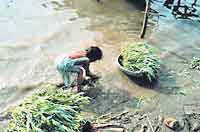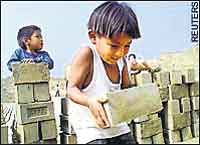|
The World Day Against Child Labour - June12 An estimated 246 million children are engaged in child labour. In Sri Lanka itself, out of 3.18 million children, 0.475 million are child workers. Of those, almost three-quarters (171 million) work in hazardous situations or conditions, such as working in mines, working with chemicals and pesticides in agriculture or working with dangerous machinery.
They are everywhere - as camel jockeys in the Gulf states, yearly contract labourers in carpet factories and factories making explosives, fireworks, matches and cigarettes in India, miners in Colombia, Bolivia and Peru, polishers of precious stones (again in India), diamond miners in ex-Zaire. They clean out the hulls of oil tankers in Pakistan, manufacture cotton goods in India, Pakistan and Bangladesh, pick jasmine by night in Egypt, make bricks from the age of five upwards (India and Pakistan), sew footballs (Pakistan), dive for pearls in Malaysia and Burma, and pack frozen fish and prawns in Morocco and the Philippines.
Why does this happen? Poverty - both of governments and individuals - is obviously a big reason. But there's more. Schooling facilities that are inadequate, too expensive, or too far away, don't encourage families to send their children to school. In a situation like that, why would parents want to deprive themselves of the small amounts of income that a child can bring? Why, in particular, would they send girls to school when they are so useful in fetching firewood and water and looking after the younger children? |
||||
Copyright © 2006 Wijeya Newspapers
Ltd. All rights reserved. |

